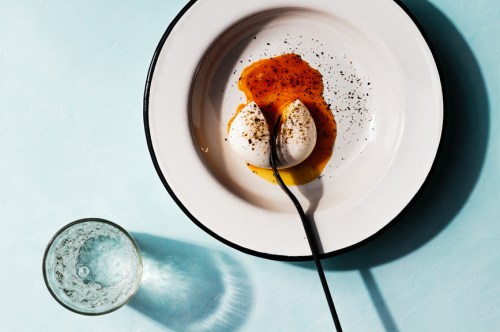This Is *Exactly* How To Peel a Hard-Boiled Egg Without Losing Your Cool, According to a Trained Chef
Learn how to peel hard-boiled eggs easily with these chef-approved tips and tricks to spare you from losing your cool.

POV: You’re heading to a brunch-themed potluck, and you’ve been tasked with making the deviled eggs. It’s all fun and games until you have to start peeling dozens of them…without accidentally squishing them into soggy egg salad.
Experts in This Article
Hard-boiled eggs are a staple for many, but peeling them can be the ultimate headache. But that doesn’t need to be the case, according to Norma Salazar, chef-instructor at the Institute of Culinary Education. We spoke with the culinary expert to learn the most effective, science-backed way to peel hard-boiled eggs without completely losing your cool.
The most effective way to peel hard-boiled eggs
According to Salazar, like most cooking endeavors, the prep work that goes into making hard-boiled eggs makes all the difference. Instead of immediately immersing your eggs in a pot of water, the chef says to stop, drop (but don’t actually), and do one important step beforehand: Give them a good poke.
“Use a skewer to punch a small hole in the round end of the egg—not the pointy end. This will perforate the air cell and allow water to get between the membrane and the egg,” Salazar says. Indeed, this simple task will help make the eggs much easier to peel. However, she notes to keep in mind that it will also reduce their unpeeled shelf-life by a bit.
While it may sound as though the eggs must be cracking when poked, upon visual inspection, you’ll see that there are no signs of an actual rupture. “The shell is, in fact, cracking so very slightly. But as the egg boils, the air cell expands and causes them to crack more. These cracks allow a little bit of water in and make the egg easier to peel,” Salazar says. Genius.
That being said, this is kind of a ‘chicken or egg’ situation—pun intended. An egg that hasn’t been cooked properly will be harder to peel, yes, but it’ll also taste like [insert shutter-inducing adjective here]. To make immaculate hard-boiled eggs every time, follow Salazar’s chef-approved tips below.
5 chef-approved tips for making foolproof hard-boiled eggs
1. Simmer, don’t boil
Aside from knocking the eggs around due to the large bubbles from a rolling boil, Salazar recommends slightly lowering the temperature to maintain a simmer. “Simmer the eggs, and don’t boil at maximum temperature. When proteins coagulate at a high temperature, they contract and dry out. This makes the inner membrane adhere tightly to the shell and the egg white,” she says.
2. Opt for older eggs
In most cases, when it comes to cooking, the fresher the ingredient, the better. However, when making hard-boiled eggs, the opposite is true. “A fresh egg is harder to peel than an egg that’s one week old,” Salazar says. According to Pete & Gerry’s egg farmers, fresh egg whites bond strongly to the inner shell’s membrane when cooked. Meanwhile, as an egg ages, the pH level rises, and the inner membrane is less likely to bond to the albumen, so the shell peels off much easier.
3. Start with a pot of cool water
“In a pot, place enough water to cover the eggs by an inch, and bring the water to a rolling boil. Gently place the eggs in, one by one. Once the water begins to simmer, start a 13-minute timer. After 13 minutes, you need to stop the cooking immediately,” Salazar says. She recommends dropping the eggs into a water bath once the timer is up to stop the eggs from overcooking.
“Place the cooked eggs in an ice bath and let them sit for 15 minutes before peeling. This stops the cooking and prevents the iron in the yolk from reacting with the sulfur in the egg white and creating a green ring around the yolk,” Salazar says.
4. Steam your eggs
For similar results, Salazar says you can steam eggs, too. (Instead of boiling them.) “Alternatively, you can add water one inch deep to a pot, then bring it to a boil. Place the eggs in a steamer basket and also allow it to cook for 13 minutes,” she says.
This might be a good option if heating a large pot of water wears your patience thin, and you’re in a hurry. Of course, Salazar says you can also add salt to the pot to help increase the boiling point. “I don’t add anything to the water; my mother adds a teaspoon of salt. Salt raises the boiling point of the water and allows it to get hotter while simmering and not a rolling boil,” she says.
5. Create a “crush zone” for peeling
Although you might typically approach peeling hard-boiled eggs with a lot of caution, Salazar says they’re more durable than you might think. “A fast way to peel a lot of eggs is to bang the side of the egg on the counter to crack it, then gently roll the egg away from you while pushing down. This will create a crush zone around the circumference. Then the halves of the shell will separate easily,” she says.
Once enough loose pieces are removed, Salazar recommends placing the eggs in a large bowl of cold water while peeling them. “Peel the eggs underwater in a large bowl. Everything comes right off and leaves the egg nice and clean. This works especially well for the tip above,” Salazar says.
An RD shares the benefits of eating eggs:
Sign Up for Our Daily Newsletter
Get all the latest in wellness, trends, food, fitness, beauty, and more delivered right to your inbox.
Got it, you've been added to our email list.










